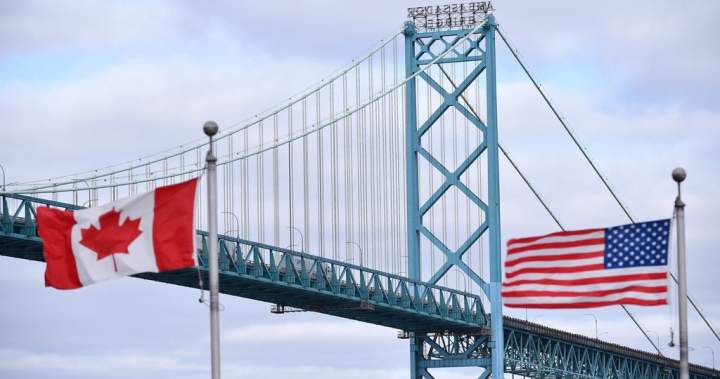The trade war is starting to impact economies across the globe, with recent U.S. data now showing consumer sentiments are reaching lows not seen since the Great Recession.
That’s raising questions about whether Canada could soon start feeling ripple effects.
“There has been more concern about momentum in U.S. labour markets, and not just in consumer perceptions of labour markets. You are starting to see cracks in some of the underlying details as well,” says assistant chief economist Nathan Janzen at Royal Bank of Canada.
“Employment is still declining in the U.S., especially in the manufacturing sector, and it’s a trend that’s been in place for a while. The trade uncertainty does not appear to have helped — it’s accelerated some of the risks.”

U.S., China extend tariff deadline for another 90 days
What does the report show?
The University of Michigan released the findings of its latest Survey of Consumers on Aug. 15, which gauges the attitudes of average consumers across the continental U.S.
Story continues below advertisement
The report, conducted during May, June and July of 2025, shows how the current trade war sparked by U.S. President Donald Trump’s tariff policies has led to a negative outlook for the job market among Americans.
In the study, 60 per cent of consumers polled said they expect unemployment in the U.S. to get worse in the year ahead, which compares to 32 per cent in 2022 until November 2024, and the worst reading since the Great Recession.
“There has been more concern about momentum in U.S. labour markets. Even just in recent weeks, there was a significant downside surprise in U.S. payroll employment growth reported for July and some significant downward revisions that made prior month’s labour market data look not as strong as it did before,” says Janzen.

Get daily National news
Get the day’s top news, political, economic, and current affairs headlines, delivered to your inbox once a day.
“We (Royal Bank Economics) don’t expect to see a resurgence (in job growth) over the next year, and still expect U.S. economic growth to slow — and with under-performance in some of these trade-sensitive sectors.“
The survey data also shows that U.S. consumers may have been changing their spending habits out of concern for how tariffs would impact the economy, including by causing prices to spike.
Twenty-four per cent of consumers polled said they expect to “spend as usual” in the year ahead on big ticket items like a car, for instance, and that’s down from 36 per cent in 2022 from August to October.
Story continues below advertisement
The report also describes the pattern where if consumers show less optimism for the economy and job market, then they will also adjust their spending habits.

Another hit to the Canadian wallet, US tariffs loom over consumers
How does Canada compare to the United States?
On the Canadian side of the border, there are some similarities to the U.S. in terms of how the economy may respond to pressures from the trade war, but the Canadian economy may be in a somewhat better position.
Story continues below advertisement
The latest report on employment from Statistics Canada for the month of July showed the unemployment rate was unchanged at 6.9 per cent, with most job losses seen in youth summer positions, while manufacturing saw a second straight positive month of growth.
“We do think that we’re close to the peak in the Canadian unemployment rate. There are some advantages that Canada has: the Bank of Canada cut interest rates more than a lot of central banks last year, and it does look increasingly likely that we’re going to have some significant fiscal stimulus from federal government spending,” says Janzen.
“It takes some time for that spending to get shovels in the ground on new projects, but into the end of this year and into next year, that is kind of a tailwind for economic growth in Canada to help push against some of the headwinds from trade disruptions.”
The Bank of Canada gradually cut its key policy rate from five per cent in 2023, to 2.75 per cent in March of 2025 — and hasn’t changed interest rates since, citing the “uncertainty” of the tariffs and the trade war.
Following the July meeting, the Bank of Canada left interest rates unchanged again, and its governor, Tiff Macklem, spoke after the announcement, saying, “There is a sense that U.S. policy may well remain unpredictable. There is a sense that it’s going to be hard to restore trust. So, yes, I think, some level of uncertainty will continue.“
Story continues below advertisement
Prime Minister Mark Carney is working towards a new trade deal with the U.S., and said he will only sign an agreement that is “good for Canada.”
He’s also set to release the fall budget, which is expected to include billions in fiscal supports for Canada.
More economic data will be released this week from Statistics Canada that should act as updated gauges on the Canadian consumer.

Youth unemployment continues to climb in Canada
On Tuesday, the Consumer Price Index for the month of July will be released.
That latest inflation reading will reflect how tariffs have caused prices to change in Canada.
On Friday, the latest report on retail sales for the month of June will be released, in addition to an early estimate for the July report.
Story continues below advertisement
“Spending has remained relatively firm, demand has remained relatively firm and we’re seeing some of that flow through into consumer price growth as well. So that’s where it’s a bit of a double-edged sword,” says Janzen, who explains how when spending and demand are strong, that can lead to higher prices and be reflected in a higher inflation report.
He goes on to say that one of the reasons consumers have been feeling more confident in Canada is because the labour market has shown strength compared to the U.S.
“It’s tied to a better Canadian consumer and overall economic demand backdrop than was feared in the spring. We should see that on Friday as well with the retail sales numbers,” says Janzen.
“Not a super strong economy, but relative to where it looked like we could have been back in the spring, it’s been substantially less bad than feared.”
© 2025 Global News, a division of Corus Entertainment Inc.






